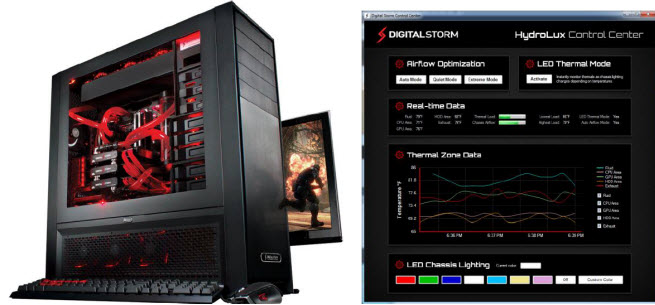Today Digital Storm is unveiling a high-end cooling system dubbed HydroLux for high-end gamer PCs.
The Fremont, Calif.-based PC maker has created a desktop system that combines liquid and airflow cooling with customizable control software. It’s just the sort of thing that hardcore gamers, who spend thousands of dollars on their computers, will need in order to cool off their systems. Gamers like to “overclock” their machines, or run them beyond the recommended specifications. That can cause overheating, but advanced cooling systems can compensate for that and let a machine run faster. The cooling system automatically adjusts to temperature fluctuations in real time.
Digital Storm bills it as “a giant leap in the evolution of PC cooling.” The software dashboard has detailed temperature graphs, thermal-linked LED lighting, and automated airflow optimization. When your dashboard turns red, it’s time to take a break. The liquid pumps can move as much as 300 gallons of cooling fluid per hour, recirculating liquid and dissipating heat. The advantage of liquid cooling is that it is a lot quieter than fans, but it doesn’t come cheap. The company didn’t say how much it would add to the cost of a system.
“We work hard to differentiate the Digital Storm brand by engineering powerful systems that meet our customer’s high-performance demands,” said Rajeev Kuruppu, Digital Storm’s director of product development, in a statement. “HydroLux delivers on that promise by providing an industry-leading cooling solution that can be fully customized to meet each user’s unique needs.”
Digital Storm was founded in 2002. The cooling system is available on all Digital Storm desktops, including the Aventum II.
VentureBeat's mission is to be a digital town square for technical decision-makers to gain knowledge about transformative enterprise technology and transact. Learn More

